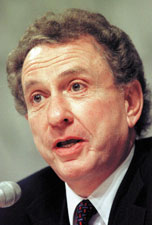URL: http://www.nature.com/cgi-taf/DynaPage.taf?file=/nature/journal/v408/n6815/full/408887b0_fs.html
Date accessed: 06 February 2001
Nature 408, 887 - 888 (2000) © Macmillan Publishers Ltd.
![]()
MATTHEW DAVIS
[WASHINGTON] Conventional wisdom has it that George W.
Bush's presidency could doom US researchers' efforts to obtain federal funding
for work using human embryonic stem cells. But supporters of the research are
optimistic that the new administration will at least review the issue before
acting. "We're very hopeful that the Bush administration will not restrict
stem-cell research, and we will work toward that end," says Tim Leshan,
director of public policy at the American Society for Cell Biology. During the presidential campaign, Bush's aides indicated that he would halt
the National Institutes of Health (NIH) initiative to support the research.
Although it was launched almost two years ago, this initiative has yet to fund
any stem-cell research. But supporters of the research think that neither Bush nor his closest
advisers have yet given the debate much thought. They note that statements from
Bush aides indicating his opposition to the NIH effort came in response to
questions from a reporter, and were not official policy. And they are advising
researchers to avoid a confrontational stance with the new administration, so as
not to drive Bush into appeasing the opponents of embryo research. The current NIH regime is still setting up a stem-cell research programme.
This effort is rooted in a legal opinion, crafted under President Bill Clinton's
administration, that says the US government can fund research with stem cells
derived from human embryos, despite the agency being prohibited by law from
supporting work with the embryos themselves. This opinion — which even some
researchers think is shaky — would take little executive action to reverse.
Loss of support: stem-cell advocate Arlen Specter will lose reign
over NIH budget. Even if the current policy remained intact, NIH officials do not anticipate
approving any embryonic stem-cell research until May at the earliest. The
deadline for the first round of applications is 15 March. People familiar with the process say that a key hold-up is the lack of
embryonic stem-cell lines that comply with NIH guidelines. The NIH is also still
vetting members of its new Human Pluripotent Stem Cell Review Group, which will
review all funding requests. Meanwhile, the expected departure of Senator Arlen Specter (Republican,
Pennsylvania), the most active supporter of stem-cell research in the US
Congress, from the chairmanship of the appropriations panel overseeing the NIH
budget, could further weaken the chances of obtaining federal funds.
Advocates of stem-cell research are worried that Bush could overturn the ruling
without having to cut off funding for any research already underway. Rather, the
administration could avoid the political heat that would come from ending the
programme outright by requesting additional reviews that would, in effect, delay
funding indefinitely.
NEWSMAKERS

Category: 31. Stem Cells